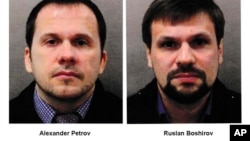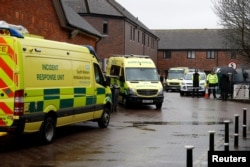Two active members of Russian military intelligence were sent to Britain in March to poison a former spy, Britain's prime minister told Parliament on Wednesday after prosecutors charged two Russian nationals with conspiracy and attempted murder.
Sergei Skripal and his daughter, Yulia, were hospitalized after being found collapsed on a bench outside a shopping mall in the southern British city of Salisbury. Investigators determined they were sickened by a Soviet-designed nerve agent called Novichok.
Prime Minister Theresa May said the two assassins were officers of the GRU intelligence service and that their actions were almost certainly approved "at a senior level of the Russian state.''
"This was not a rogue operation,'' she told lawmakers after police released photos of the suspects as they traveled through London and Salisbury before flying back to Moscow from Heathrow Airport on the evening of March 4, hours after the Skripals were poisoned.
Sue Hemming, director of Legal Services at the Crown Prosecution Service, said Wednesday that there was sufficient evidence to charge Alexander Petrov and Ruslan Boshirov with using Novichok in violation of chemical weapons law; conspiracy to murder Sergei Skripal; and the attempted murder of both Skripals and a British police officer who was also poisoned.
While Britain has blamed Russia for the attack since early in the investigation, Russia has repeatedly and strongly denied any involvement.
Russian officials said they did not recognize the suspects. Foreign Ministry spokeswoman Maria Zakharova said the names and images of Petrov and Boshirov "say nothing to us.''
Hemming said Britain would not be asking Russia to extradite the men because that country's constitution does not permit extradition of its own nationals. But she said a European Arrest Warrant had been issued in case they traveled to any participating nations.






